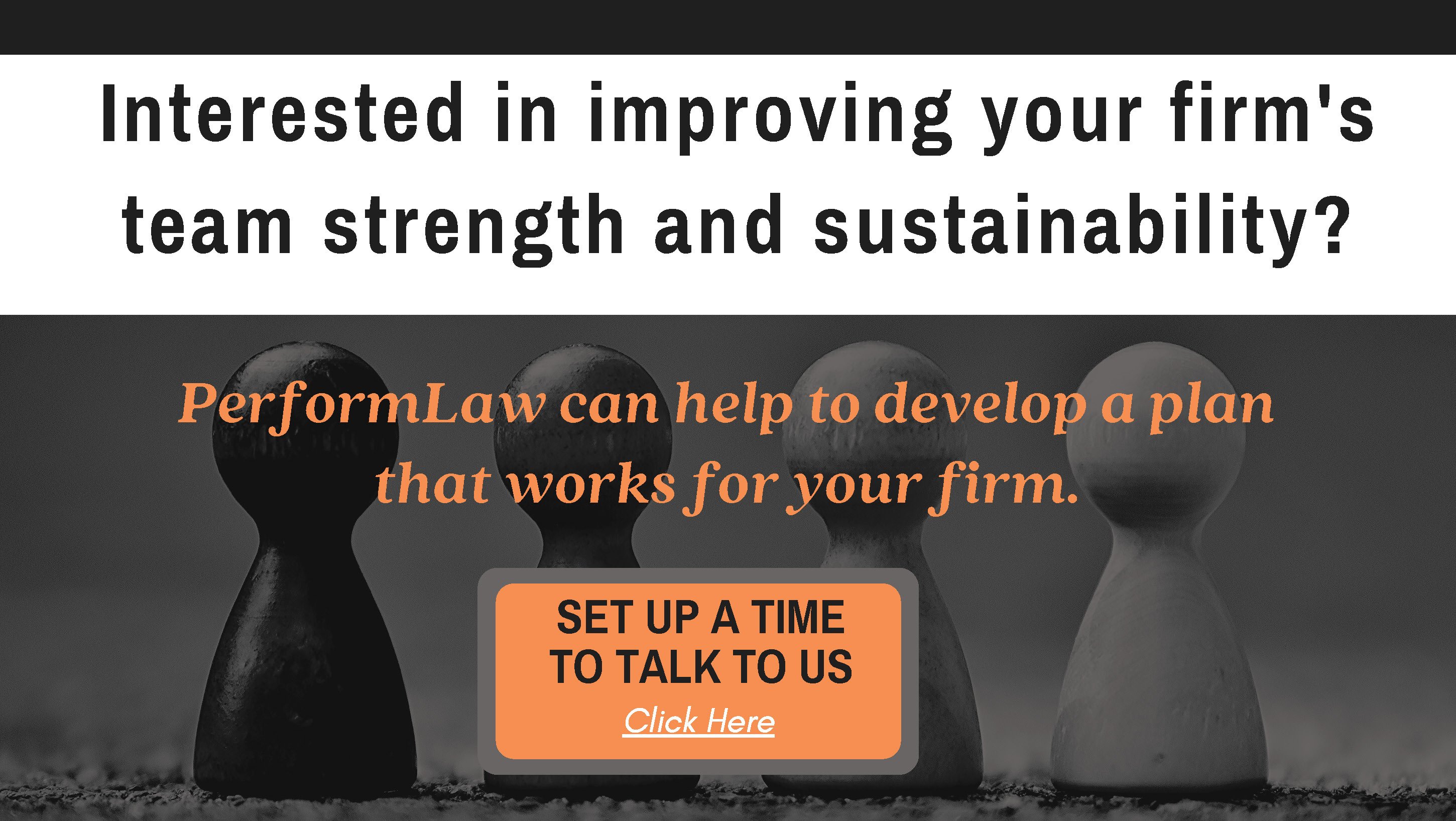Law firms will always need attorneys with energy, experience, and skill to survive. Smart firms strive to help their people realize their full potential while others take a much narrower view of their relationships with their attorneys. While attorney performance is a combination of several factors, the following signs may indicate that law firm performance management may be a problem at your firm.
1. Underperforming Lawyers
When firms struggle with poor-performing lawyers, the root of the problem is usually not inadequate compensation. Underperformance is usually attributed to a firm’s lack of transparency and clear progression path for its lawyers. These firms often lack a communication process that ensures attorneys receive regular performance feedback. As a result, the lawyers at these firms are typically unsure that their hard work will pay off.
2. Negative Culture
Firms struggling with attorney performance typically have one or more negative factors in their culture. The most common include a lack of transparency and fairness in the evaluation of performance and pay, a poor commitment to training associates, unreliable communication systems, and a poor commitment to diversity. Firms with poor attorney performance should first evaluate their law firm culture.
3. Poor Evaluation Measurements
Once a firm gains a clear understanding of each lawyer’s financial performance and pay level, it is necessary to look deeper into performance in qualitative areas. Firms with inadequate performance evaluation systems have often failed to assess the environmental factors that lead to poor results. For example, struggling lawyers often suffer from a combination of factors that may include poor business hygiene, weak work ethic, inadequate training, insufficient supervision and mentoring, or lower quality work.
If a firm has not taken the time to document the necessary practice skills and the expected timeline that relate to strong work quality and practice skills (model criteria), it cannot properly measure its attorney’s current performance. Using unsuitable performance measurements can result in wrong performance conclusions, bad decisions, and unnecessary turnover.

4. Unclear Progression Criteria
Career progression criteria matter most to attorneys who think strategically about career development. When progression criteria are vague or non-existent, the future is less specific. Firms that don’t or can’t articulate with some certainty what it takes to progress, create a serious demotivator. Performance in these situations trends toward at or below the minimum. Without solid long-term prospects, a firm’s best associates may work hard but leave once marketable skill sets are acquired.
Read article: Expediate Associate Value by Setting Expectations
5. Lawyers Operating Below Experience Level
Poor performance also includes lawyers who operate at or below expected levels when compared to experience. When economic factors are the only consideration, it is possible to miss lawyers who are falling behind.
Longer-term, the firm’s legal capability diminishes, and as senior partners age, the firm is ill-equipped to continue to service client needs. When this occurs, the firm has the on-paper capacity to handle client needs but not the ability to do the work. The costs related to keeping the lawyers below experience level make it difficult to hire better-prepared laterals. If it comes to it, letting attorneys go who have historically performed by economic measures is problematic.
6. Increased Turnover Rates
High turnover rates are almost always a characteristic of systemic issues resulting in poor attorney performance. Some turnover is healthy, but when firms lose talented lawyers with steady work habits, there is an internal issue. In addition to the hard costs associated with turnover, the damage to the long-term prospects of the firm is incalculable. High turnover rates also negatively impact law firm recruiting.
Read article: High Law Firm Turnover: Why it happens & What to do about it
More articles about building an effective attorney development system at your firm:
-
Extending the Life of Your Firm with Attorney Development
Focusing on attorney development from the start also gives law firms a competitive advantage in attracting and retaining the most talented lawyers and in being better prepared for the future.
- An effective attorney development system should include the following components recruiting effectiveness, associate quality, work ethic, suitability for the role, training and mentoring, clear expectations, compensation and incentives, evaluation process, and feedback.
PERFORMLAW CAN HELP
If your firm is showing any of these signs, we can help. We regularly design law firm attorney performance management programs that include compensation and benefits, practice planning and guidance, progression policies, and processes for improving communications. We can engage with you on a project level or as part of a longer-term attorney performance improvement and monitoring relationship. Contact us now.
.webp?width=124&height=108&name=PerformLaw_Logo_Experts3%20(1).webp)


